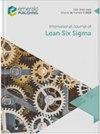Toyota Kata for continuous improvement; an action research project in the construction industry
IF 3.7
2区 工程技术
Q2 ENGINEERING, INDUSTRIAL
引用次数: 0
Abstract
Purpose The purpose of this study is to investigate how Toyota Kata can be effectively applied in the engineer-to-order (ETO) manufacturing within the construction industry. The objective is to identify the critical success factors (CSFs) for the Toyota Kata implementation in this environment and to develop a continuous improvement (CI) method – based on Toyota Kata and adapted to the ETO manufacturing within the construction industry. Design/methodology/approach An action research (AR) approach was applied, which includes a participatory form of inquiry and learning from both intended and unintended outcomes, while simultaneously building up scientific knowledge about successful implementation of Toyota Kata. Findings All the CSFs in the AR project are addressed by the earlier literature, thus confirming the existing body of knowledge. Moreover, the existing knowledge was arguably extended through the modified Toyota Kata as an approach for CI. New elements regarding how to run the small experiments by extending the core team with personnel who work with the problem on a daily basis. Originality/value This research addresses a gap identified in the literature regarding how Toyota Kata can be adapted to the ETO manufacturing within the construction industry. It also presents an overview of CSFs for the Toyota Kata implementation in this environment.丰田Kata持续改进;建筑业行动研究项目
目的本研究旨在探讨丰田Kata如何有效地应用于建筑行业的工程订单制造。目标是确定在这种环境下实施丰田Kata的关键成功因素(CSF),并制定一种基于丰田Kata并适应建筑行业ETO制造的持续改进(CI)方法。设计/方法论/方法采用行动研究(AR)方法,包括参与式的调查和从预期和非预期结果中学习,同时积累关于丰田Kata成功实施的科学知识,从而确认现有的知识体系。此外,现有的知识可以说是通过改进的丰田Kata扩展的,作为CI的一种方法。关于如何通过将核心团队扩展到每天处理问题的人员来运行小型实验的新元素。独创性/价值这项研究解决了文献中关于丰田Kata如何适应建筑行业ETO制造的空白。它还概述了丰田Kata在这种环境下实施的CSF。
本文章由计算机程序翻译,如有差异,请以英文原文为准。
求助全文
约1分钟内获得全文
求助全文
来源期刊

International Journal of Lean Six Sigma
Engineering-Industrial and Manufacturing Engineering
CiteScore
8.90
自引率
15.00%
发文量
46
期刊介绍:
Launched in 2010, International Journal of Lean Six Sigma publishes original, empirical and review papers, case studies and theoretical frameworks or models related to Lean and Six Sigma methodologies. High quality submissions are sought from academics, researchers, practitioners and leading management consultants from around the world. Research, case studies and examples can be cited from manufacturing, service and public sectors. This includes manufacturing, health, financial services, local government, education, professional services, IT Services, transport, etc.
 求助内容:
求助内容: 应助结果提醒方式:
应助结果提醒方式:


